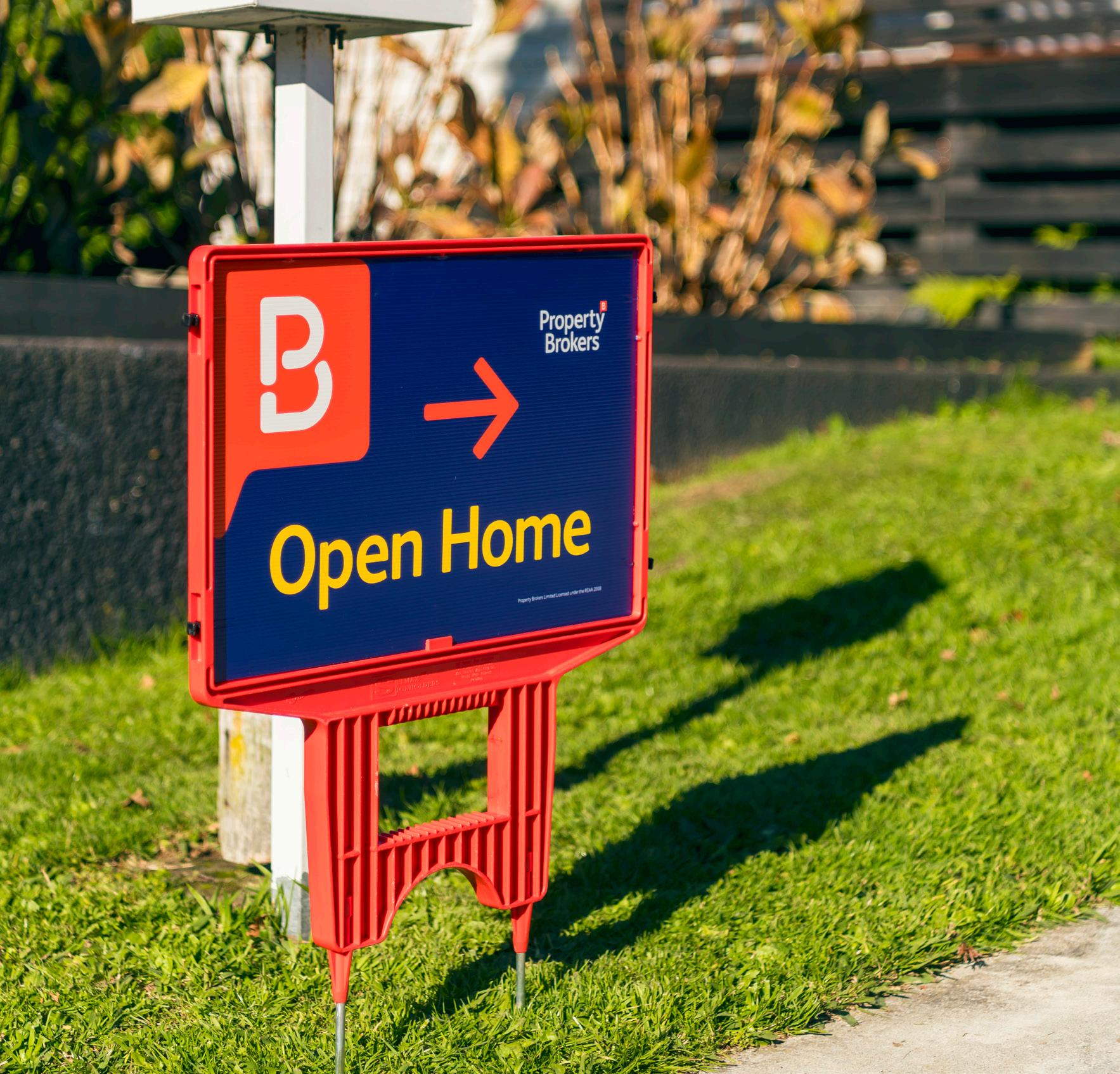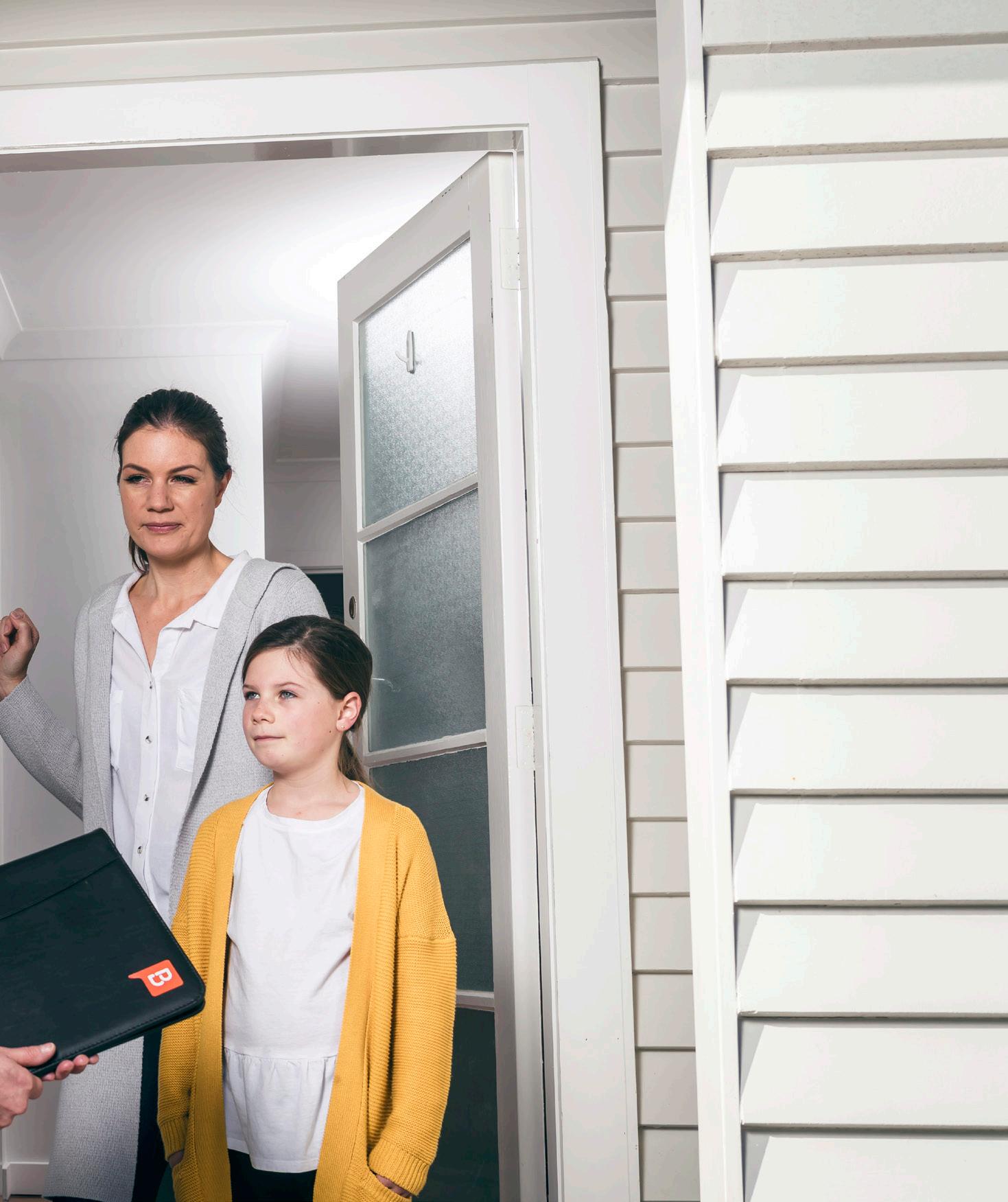A guide to buying your first home

pb.co.nz Property Brokers Ltd Licensed REAA 2008
Congratulations, you’ve decided to purchase your first home. Exciting times are ahead. This booklet will take you through the process of buying your first home, and help make the journey as straightforward and stress-free as possible.
Section 1
How much can I spend?
What are the costs?
Finding a suitable solicitor
Section 2
Finding a real estate sales consultant
Qualities of a good sales consultant
Does the sales consultant work for the buyer or seller?
Contents
4
6
7
7
3
Mortgage types
Government assistance
11
12
16
17
18
9
10
First home checklist 14 Let the search begin Section 3
Buying your perfect home
Sales methods
Making an offer Section 4 19 Going unconditional 20 Insurance 21 Settlement Section 5 22 Glossary of terms
How much can I spend?
The first step in finding out how much you can afford is to visit your bank or a mortgage adviser. They will be able to tell you how much you can afford to borrow based on your initial deposit, how much you earn and what your expenses are. They can often pre-approve your mortgage before you look for your first home so you know the maximum amount you can offer in advance.
Be sure to shop around the banks and mortgage advisers for the best deal. The mortgage market is competitive, and there are some great deals to be found.

Section
1
The best first home you can buy, is one that you can afford.
3
There are three main types of mortgage Mortgage types

Floating interest rate
Your interest rate will rise and fall as national money rates change. You are given notice of any changes.
If rates go up, your repayments will probably go up, however, your repayments could reduce if rates fall. Within reason, you can make early repayments and change your level of regular payments.
Fixed interest rate
Your interest rate will remain the same for a set term, usually six months to five years. At the end of the set term, you can choose another fixed rate loan, or switch to a floating rate mortgage. There is usually an extra fee if you pay back some, or all of your loan early.
Combination loan
Your loan is split between fixed and floating. This offers the best of both options.
4
The following table is a guide to how much you could pay from your weekly income to cover your mortgage based on approximate weekly payments calculated over a 30-year term. To reduce the term, you can increase these payments.
Disclaimer: The figures provided from the calculators on this website are for indicative purposes only and cannot be considered quotations or pre-qualification advice for any financial product or service. Please consult your legal or financial adviser prior to proceeding with any transactions.
$165 $175 $186 $196 $207 $219 $220 $234 $248 $262 $277 $292 $275 $292 $309 $327 $346 $364 $330 $351 $371 $393 $415 $437 $385 $409 $433 $458 $484 $510 $440 $467 $495 $524 $553 $583 4% 4.5% 5% 5.5% 6% 6.5% To work out your repayments based on more exact figures, visit our online mortgage calculator pb.co.nz/buy/mortgage-calculator
How much will I pay each week?
$150,000 $200,000 $250,000 $300,000 $350,000 $400,000 5
Government assistance
First Home Loan
Most lenders require a deposit of around 20%, However, with a Kāinga Ora First Home Loan, you only need a 5% deposit to buy your first home.
To see if you qualify visit kaingaora.govt.nz/home-ownership/first-home-loan/
First Home Grant
If you are in KiwiSaver and have contributed to a scheme for at least three years, you may be eligible for a First Home Grant. This means that the government could give you up to $5,000 towards an older, existing home or up to $10,000 towards a newly built home or land to build a new home on. If borrowing with someone else, you can combine those grants, which means up to $20,000 if you have both contributed to KiwiSaver for five years. There are other eligibility criteria to meet and regional house price caps.
To see if you qualify visit kaingaora.govt.nz/home-ownership/first-home-grant/
KiwiSaver first-home withdrawal
The KiwiSaver first-home withdrawal allows eligible members to withdraw their KiwiSaver contributions (including tax credits). However, at least $1,000 must remain in their KiwiSaver account.
Find out more about KiwiSaver withdrawals speak with your KiwiSaver scheme provider.
6
What are the costs?
The following list gives you an idea of the costs involved on the path to home ownership. Your real estate sales consultant or mortgage adviser will be able to help you understand each item.
• Bank fees, up to 1% of the loan amount
• Valuer’s fees
• Solicitor’s fees (purchase only)
• Builder’s report (written)
• Builder’s report (verbal)
• Council report (LIM)
Ongoing Costs
• House and contents insurance
• Income/mortgage protection
• Life insurance
• Lender mortgage insurance
• Meth testing
• Rates; you may be required to pay a portion of the rates if they were pre-paid by the previous owner
• Moving costs
• Mortgage repayments
• Rates
• Repairs and maintenance
Finding a suitable solicitor
You will need to appoint a solicitor who specialises in conveyancing. Conveyancing is the legal process of transferring ownership of a property from one person to another.
It is wise to appoint a reliable solicitor to handle the legal aspects of your property purchase. This will give you peace of mind knowing that your best interests are protected.
7

Section 2 8
Finding your perfect home
Finding a real estate sales consultant
Qualified sales consultants have completed an NZQA-approved course specialising in real estate. They are trained in marketing, negotiation, real estate law and the entire process involved when helping buyers purchase a property.
Finding someone you trust and feel comfortable working with is essential; one of the best ways is to ask around. Many happy people have purchased their first home with the help of an experienced Property Brokers sales consultant.
Our sales consultants offer a professional service, and they know what is happening in the marketplace at any given time. This can save you time and take the stress out of the complexities of buying your first home.
You can also call a sales consultant about a specific property you’ve seen advertised and arrange a suitable time to view it. You can attend an open home, but sometimes it’s better to look around with just the sales consultant so that you can ask questions and take your time.
Contact one of our sales consultants to get the ball rolling. They will spend some time getting to know you and what you are after so they can match your search requirements with the perfect property for you.
9
Qualities of a good sales consultant

• Extensive knowledge of the area and the current real estate market
• The ability to listen to your property needs and wants
• Great communication skills to keep you well informed of new-to-the-market properties, return any calls or emails, answer all your questions and keep you up-to-date with progress along the way
• Proactive, so that you are never in the dark and can be assured that you are top-of-mind
• Enthusiastic and motivated to find you the best property for your needs
• A high level of professionalism and integrity
• An experienced team of experts working alongside them
10
Does the sales consultant work for the buyer or seller?
The sales consultant works for the seller; however, they must act in good faith and deal fairly with all parties, so you can be assured that they also have your best interests in mind.

Our sellers provide us with fabulous homes to sell, and our commission is paid by them when we have completed the sale of their property.
However, only with buyers can we complete the job for our sellers.
Our job is to provide buyers and sellers with good quality information so they can make informed decisions and get a result everyone is happy with.
11
First home checklist
We all have different wants and needs for our home. Make a list containing the features and aspects you feel are necessary. Remember, your first home will be more affordable if you steer clear of wanting every luxury and are willing to embrace a little DIY. The shorter your list, the greater your choice for your available funds.
This checklist will help you prioritise what’s important. Once finished, give a copy to your sales consultant. They can then match your needs with properties available on their database.
Preferred location:
Number of bedrooms:
Number of bathrooms:
Other information:
12
Priority
Open plan – Lounge, kitchen, dining
Separate lounge
Separate dining room
Separate family room
Separate toilet
Separate bathroom
Gas hot water
Gas cooking
Gas heating
Log burner
Heatpump
Garaging
Off street parking
Spacious backyard
Fully fenced
Privacy
Home needs renovating
Storage
Study / office
Low maintenance garden
13
High Medium Low
Let the search begin
Online
This is by far the most popular way to find a property. There are many websites that will allow you to search for properties that match your search criteria. Once you’ve found a property you like, feel free to call your sales consultant to ask any questions, or to make a time to view the property. Alternatively, make note of the open home time and view then.
Property alerts
Discover suitable properties faster with this unique feature. Simply set up and save a search based on your preferred property criteria, and you’ll never miss out on properties that tick your boxes again!
Start your search now at pb.co.nz
Sites we recommend:
pb.co.nz As market leaders across provincial New Zealand we have the best selection of local properties. realestate.co.nz This website has the most properties out of any website in New Zealand. We also recommend that you download their app. oneroof.co.nz This website enhances New Zealand’s latest real estate with the latest property and market insights to help make your property decisions easier. nzrealtors.co.nz The website of the NZ Realtors Network, a group of independent real estate companies throughout New Zealand, is a great site to look at if you are looking for property throughout New Zealand.
14
There are several places you can look for your first home
Newspapers
Your local newspaper will usually showcase real estate listings twice a week.
Property publications
There are various publications available which are delivered to your letterbox and also available outside the premises of most real estate companies and at your local supermarket.

Window displays
Most real estate companies will have a window display of properties for sale in their front window. You are welcome to look at these at any time.
Open homes
Open homes have become the buyers preferred way to view homes. Each week’s open homes are displayed in property publications, on websites, social media and on For Sale signs outside the property.
Try not to arrive to view an open home right on closing time because it’s likely the sales consultant will have another open home to move on to straight after.
When you arrive, the sales consultant will ask you for your name, address, telephone number and email address. This information is for the sales consultant and also for security and health and safety purposes. The sales consultant will hand you an information sheet which includes some features of the home, photos, legal details and their contact details.
View the home at your leisure and ask the sales consultant any questions you may have about the house.
15
Buying your perfect home
Finance
You have found a home you’d like to make an offer on. Now it’s time to arrange your finance, if you haven’t already.
Your bank or mortgage adviser can source finance options to suit your needs and circumstances, including how long you are likely to stay in the property and future plans and match these to trends in mortgage interest rates. They can also assist with complications or other problems in the sales process, so you can move into your first home as quickly and smoothly as possible.
Ask your bank or mortgage adviser to structure your mortgage in a way that minimises the duration of your loan without destroying your lifestyle.
Balance is key. You must be able to have an acceptable standard of living while paying off the mortgage.

Section 3
16
Sale methods
There are a number of ways that you can buy a property; it is a big decision, so it is important that you understand these.
Offers and negotiation with a price guide
The home is advertised with a price, price range or ‘buyers $xxx,xxx+’. This gives you a good indication of the seller’s price expectations. With the help of your sales consultant using a sale and purchase agreement, you make an offer in writing and then negotiate with the seller until you all agree on a price and the conditions of sale. Your Property Brokers sales consultant will guide you through this process. You may need to add conditions to your offer, such as a builders report or time to arrange your finances.
Auction
Buying at auction is like public negotiations – everyone who is interested in a property bids for it at the same time in the same room, on a specified date and time. It can be a little intimidating but it is actually a quick and simple process, just talk to a Property Brokers sales consultant and they will talk you through the whole process. It is a good idea to attend some auctions beforehand to watch what happens and familiarise yourself with the process before you bid at one.
It is important to do all your homework before auction day – such as arranging your finances and completing your due diligence on the property – because, should you be the successful bidder, you are required to pay a deposit immediately (usually 10%) and the sale goes unconditional.
Deadline sale
The deadline sale method is similar to an auction and tender except it gives the seller more flexibility.
The property is offered for sale without a price, (although there may be a price guide), with a deadline time and date upon which offers need to be submitted. However, the seller reserves the right to accept an offer at any time before that date (unless otherwise stated). You can make an offer at any time prior to the nominated time and date.
Offers and negotiation without a price
The property may be offered for sale by negotiation. You are invited to make an offer in writing and negotiate with the seller until you all agree on the price and conditions of sale.
This method is similar to the previous method, without an indication of the seller’s expectations, so talk to your sales consultant to find out what similar properties are selling for and decide on an offer that you are comfortable with.
Tender
When a property is being sold by tender, prospective buyers submit confidential written offers to the sales consultant before the advertised closing date and time. No price is set, and you will not know what other people are offering, so it is important to put in an offer that you are comfortable with. All submitted offers will be opened at the same time, in the presence of a Property Brokers sales consultant. The seller has the choice of accepting any of the offers, not accepting any or negotiating further. If your offer is accepted, it is legally binding. Your offer may be unconditional (where there are no conditions to fulfil) or conditional (your offer to buy has conditions to satisfy first, such as arranging finance or being satisfied with a builders report).
17
Making an offer
Once you have found a property you are interested in buying, you need to contact the real estate sales consultant selling the property and advise that you wish to put in an offer.
You can put in an offer for less than the asking price. However, this may or may not be accepted by the person selling. All parties will need to sign the offer, which will be on a sale and purchase agreement.
When you make an offer, your sales consultant is obliged to present your offer to the seller, regardless of whether it is favourable or not.
When you are negotiating, you will need to ensure you allow enough time to obtain your mortgage finance, a council report, contamination testing and an independent valuation, should these be required. Make sure that these provisions are included in the sale and purchase agreement as special conditions.
Your solicitor will search and confirm the title to the property and ensure all special conditions in the agreement (such as obtaining finance or a builder’s report) are satisfied. Once these things have been done, your solicitor will advise the seller’s solicitor that the agreement is unconditional.
Once the agreement is unconditional (all conditions have been satisfied), you are required to pay a deposit unless other agreements have been made (usually 10% of the purchase price). This deposit is paid to the real estate company to be held in trust until the agreement is settled.
Real Estate Agents Act 2008
What are the real estate company’s obligations?
Your real estate sales consultant must give you a copy of the New Zealand Residential Property Sale and Purchase Agreements Guide. You must acknowledge receipt of this guide by signing an acknowledgement form. This Act binds all licensed real estate companies.
There are copies of the Act available at your real estate branch office. Please ask your Property Brokers sales consultant if you wish to view a copy.
Before you commit yourself to an offer on a home, you may wish to seek expert advice about some of the aspects of the property. Your sales consultant can put you in touch with reliable professionals such as valuers, surveyors, builders and electricians who can assist you.
18
Section 4
Going unconditional
Once your offer is accepted, you will need to work through all of the conditions. Once these conditions have been satisfied, talk to your solicitor. If all went well and you wish to proceed with purchasing the property, your offer becomes ‘unconditional’, which means that you are legally bound to buy the house.

19
Congratulations
Insurance
It is important to protect the value of your first home. It is probably the largest investment you have made, so don’t put it at risk if a disaster happens.
You should ask yourself the following questions to determine the level of insurance cover you may require.
• If my home is destroyed or damaged, am I sufficiently covered to restore my home to its current state and condition?
• If I am sick or have an accident, do I have sufficient income to live, including payment of my mortgage?
• If I become disabled or pass away, will my mortgage be paid off? Will my family have sufficient funds and income to maintain their current way of life?
Here are some of the types of policies available:
Mortgage protection
Many companies offer these combined contracts, providing protection in case of redundancy, illness or death.
House and contents
Provides protection in the event of fire, burglary, earthquake and other disasters. You should ensure that you are covered for at least the replacement value of your property and belongings.
Disability
This is helpful if you are off work through illness or accident. This type of policy normally provides you with 75% of your regular income.
Health
Helps pay for expensive medical, surgical, hospital or dental bills.
Life
Pays out a specified amount to your estate upon your death.
20
You’ve gone unconditional, so what happens next?
Settlement
Pre-settlement inspection
This is your last opportunity to view the property before you instruct your solicitor to release the funds to the seller’s solicitor. Arrange a time for your sales consultant to accompany you to the property to do the pre-settlement inspection.
All you need to do is check the property is in the same condition as when you viewed it. If there were some changes agreed to and included in the sale and purchase agreement, check that these changes have been completed and everything is in order for settlement to take place.
Settlement
Settlement is the last step in the legal process. This is when your solicitor will hand over the funds to the seller’s solicitor in exchange for the ‘Transfer of Title’, meaning you now have legal ownership of your new home.
Keys
On settlement day you will need to get the keys to your new home. It is best to liaise with your sales consultant regarding the keys; if they are not holding them they will know who is.

Moving in
When you have paid the money and received the keys, it is time to move into your new first home.
21
Glossary of terms
Asset
Anything of monetary value that is owned by a person, eg. property, vehicles and bank accounts.
Auction
A public sale of a property or real estate that is sold to the highest bidder when the owner’s reserve is reached. Sellers have the ability to set a reserve price and a suitable settlement date prior to the auction. The auctioneer is not permitted to sell the property below the reserve price without authorisation.
Acceptance
The consent of the person receiving an offer to be bound by the terms and conditions of the person making the offer. Acceptance of an offer constitutes an agreement.
Agreement
The written contract for the sale and purchase of property between the seller (vendor) and the buyer (purchaser).
Asking price
The listed price of the property. The owner may be willing to negotiate, therefore this may not be the same as the selling price.
Building code
Local council regulations that control design, construction and materials used in construction.
Caveat
A warning on a title to a purchaser that a third party might have some interest or right in the property.
Certificate of Title
A description of a property with the name of the registered owner, and encumbrances, i.e. mortgages or easements on the property. It must be produced by the vendor before the sale of the property.
Chattels
Removable items of personal property. In real estate transactions, chattels included in the sale usually include the stove, television aerial, carpets, blinds, curtains, drapes and light fittings. However, unless chattels are specified in the agreement, they are not sold as part of the property.
Conditions
Special conditions stated in a sale and purchase agreement.
Commission
A proportion (usually a percentage) of the sale price of a property paid to a real estate sales consultant for negotiating a real estate transaction.
Conveyancing
Conveyancing is the legal process of transferring ownership of a property from one person to another.
Covenant
Terms, conditions and restrictions noted on the title. A covenant may affect future plans or resale of the property.
Cross lease
This type of ownership is common where there is more than one home on a block of land. You are all owners of the land and you each lease your home. The lease may provide for an exclusive use area for each cross-lease.
It is like owning a freehold property but there are some restrictions. Another form of ownership for more than one home on a block of land is a unit title.
Deposit
A percentage of the purchase price given to bind the sale of real estate. For the bank, this is your contribution towards the purchase of your property. The deposit is payable to the real estate company as a holding payment to secure the purchase.
Easement
A right that someone has to use the land belonging to another, e.g. a water authority may have a sewerage easement across part of your property.
Equity
The amount of an asset actually owned. Equity is the difference between the market value of the property and the amount still owed on its mortgage.
Exclusive listing/sole agency
A written contract that gives a licensed real estate sales consultant the exclusive right to sell a property for a specified time.
Fee Simple
The greatest possible interest a person can have in real estate.
First mortgage
A mortgage that is the primary loan against a property.
Fixed interest rate term
Time frame the interest rate is set for.
Fixtures
Fixed items that cannot be removed without damaging either the property or the fixture itself, e.g. cupboards.
Freehold
An estate in ‘fee simple’ which continues for an indefinite period of time. Freehold estates may be inheritable or non-inheritable. Inheritable estates include the fee simple absolute, the qualified fee, and the fee tail. Non-inheritable estates include various life estates which are created by acts of parties, such as an ordinary life estate, or by operation of law.
Section 5 22
Guarantor
A person who agrees to indemnify the holder of a loan or a portion of the unpaid principal balance in case of default by the borrower.
LIM report
(Land Information Memorandum)
A LIM is a report prepared by the local council at your request. It provides a summary of property information held by the council.
Listing
A written contract between an owner (vendor) and a real estate sales consultant, authorising the sales consultant to perform services for the principal involving the owner’s property.
Loan
A sum of borrowed money that is generally repaid with interest.
Market value
The price at which a seller is happy to sell and a buyer is willing to buy. Establishing the market value is the objective of an appraisal.
Mortgage
A legal document that pledges a property to the lender as security for payment of a debt.
Mortgage adviser
An individual or company that brings borrowers and lenders together for the purpose of loan origination. Mortgage advisers typically require a fee or a commission for their services, usually paid by the lender.
Negotiation
Make an offer and we will attempt to negotiate a concluded contract between the parties.
Offer
Conveyed intent by one party to form a contract, which may have conditions and stipulations, with another party.
Private sale
The sale of property by the owner without the services of a real estate sales consultant. The homeowner takes on all the responsibility for selling their own property.
The Real Estate Institute of New Zealand advises against this method of sale. This puts the seller at considerable risk and in a position where there are very little compensation options if something goes wrong.
Private treaty sale
The sale of property, through a real estate sales consultant, by negotiation. This is considered the traditional method of selling a home. A buyer and seller agree on a fixed price and sign a contract effecting the sale.
Real estate sales consultant
A person or company licensed to negotiate and transact the sale or lease of real estate on behalf of the property owner.
Rateable value (RV)
The value of your property, for rating purposes, as determined by Quotable Value New Zealand.
Real Estate Sales Agents Act 2008
A New Zealand Government Act under which real estate companies are bound.
Sale and purchase agreement
It is a form that a contract for sale will be drawn up on.
Settlement
The sale of a property is finalised by the legal representatives of the vendor and the purchaser, mortgage documents come into effect, costs are paid and the new owner takes possession of the property and receive the keys.
Sole/exclusive agency
A sole or exclusive agency precludes all other sales consultants from working on the disposal of the property, although another sales consultant may approach the sole sales consultant if the former has a suitable client. But even then, the sole sales consultant would finalise the deal.
Title
A legal document evidencing a person’s right to, or ownership of a property.
Title search
A check of the title records to ensure that the seller is the legal owner of the property and that there are no other claims or outstanding permits.
Unconditional agreement
The legal contract that binds both the purchaser and the seller to settle on.
You should only consider entering an unconditional agreement if and when you are absolutely sure you want to buy a particular property. Finance should be arranged and there should be no other issue that must be satisfied. An unconditional agreement commits you to purchasing the property.
Vendor
The person or entity legally authorised to sell a property.
Zoning
Local authority guidelines for the permitted use of land.
For all your property needs, please call 0800 367 5263 Licensed
REAA 2008
Disclaimer. While all care has been taken in preparing this publication, Property Brokers Ltd, its sales consultants and staff accept no responsibility for the accuracy of the information at any time. The information contained has been prepared by PBL for informational purposes only and should not be a substitute for legal, or other professional, advice; you are advised to seek specific advice relevant to your circumstances from a suitably qualified professional. PBL does not accept any responsibility or liability for any action taken as a result of relying directly or indirectly on the information in this document. How you use the information is your sole responsibility. If you have concerns about the information in this publication, contact PBL directly. 01/12/22










